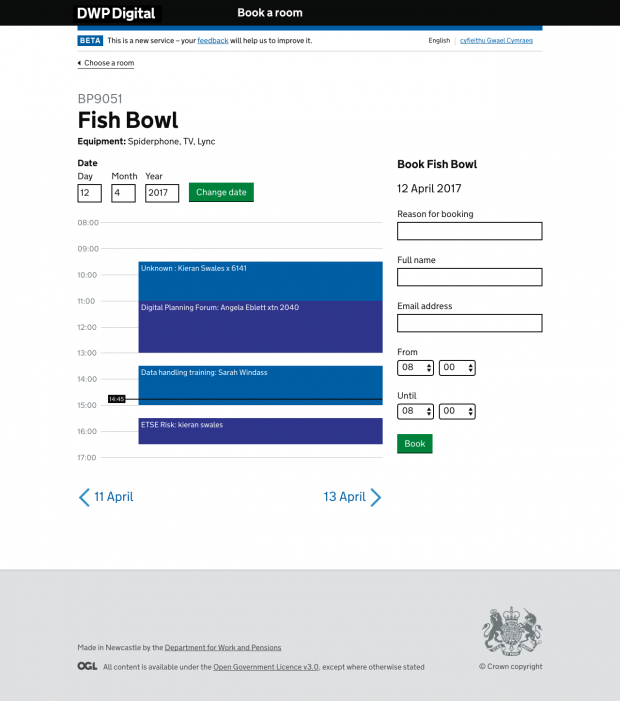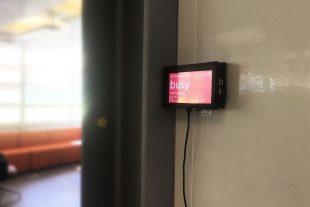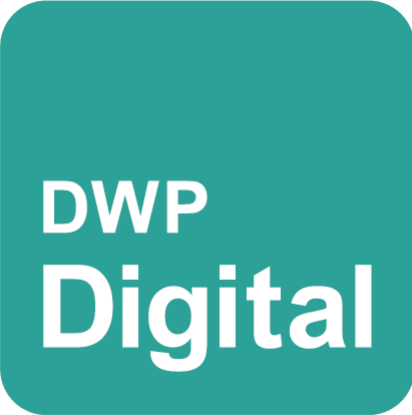
I’m Craig Abbott, an interaction designer based at DWP Digital's Newcastle hub. Since joining DWP in 2015, I’ve heard people mention how hard it is to book a meeting room. Something that should be so simple is often a series of frustrating workarounds.
First, we used a Confluence calendar. This was difficult to understand at a glance, and because of this rooms would often end up double-booked. This led to awkward interruptions and wasted time for teams.
After the Confluence calendar, we moved to an off-the-shelf solution that looked promising. However, we quickly realised this excluded many people; not everybody was trained to use it and not everybody is connected to the same network.
This solution also depended on Microsoft Outlook, something MacBook users don’t always have access to. This led to some people moving away from using it and the rooms effectively becoming a free-for-all. It also led to an influx of people from other teams or different buildings using the rooms.
The next solution was a spreadsheet in a shared drive. This reduced double bookings but brought its own problems. The shared drive again isolated people on different networks. And if somebody forgot to close the spreadsheet it would get stuck in read-only mode, locking everyone else out.
Complex Excel macros were then introduced to try to detect when the spreadsheet had been left open and then close it down automatically.
All very complicated. So we began to think about building something better.
Time for a hack day
A core team of designers, developers, delivery managers and business analysts got together, joined throughout the day by other people dropping in and out. The event brought the whole hub together and really helped us tackle the problem in an agile way. We discovered the user needs so we could build a proper backlog of things to do.
We found that users need to:
- be able to book a room on whatever device they use
- book a room so that their meeting can be held somewhere appropriate
- get confirmation that they have booked a room so that they have evidence if there is any contention
- know what AV equipment is in the room so that they can book the right room for their meeting
We also found that the hub management team need to make sure that people who work in the building have priority when it comes to booking rooms. People who work outside DWP are welcome to use the service to book rooms in Newcastle, via the hub management team.
Once we had the user stories we started to prototype some ideas. By the end of the hack day we had something that we thought would work. We presented this back to the hub as a show-and-tell, gathered feedback and then turned the prototype into a web application. Just a couple of days later it was handed over to the hub management team so that people could start using it.

Up and running
Our custom-made booking system is now being used here in Newcastle, and we are collecting feedback to help refine the backlog. Based on this insight we have already published one iteration since going live. Now we're working on the next feature and have been collaborating with the analytics team to try and build up a better understanding of how people are using the application.

We are also trialling a door display to let people see the availability of rooms in real time. This was built as a separate web application and installed onto a Raspberry Pi.
Since the new system went live, we’ve definitely noticed fewer people sheepishly backing out of rooms after walking into the wrong meeting.
All of the code is open source. It’s hosted on GitHub, so hopefully more people will be able to contribute and meet even more user needs. If you're interested in the technology and code behind the system, there will be a follow-up post covering the application in more depth.
In the meantime, you can see what we’ve been doing with the booking system, the supporting application programme interface (API) and the Raspberry Pi display on GitHub.

10 comments
Comment by Ashley Hardie posted on
This has had so much benefit to the people in the hub. It solved the issues of double bookings and multiple platforms to make a booking and has been absolutely invaluable.
The great thing about this temporary tool is that there are some similarites to the full DWP Corporate Solution for room bookings, owned by the Unified Communications team and is due to be introduced into Newcastle soon.
Great stuff. ??
Comment by Mick robson posted on
Great tool! I've used it a few times now and it just makes room booking effortless. Thanks for your efforts, much appreciated 🙂
Comment by Craig Abbott posted on
Thanks, Mick. Appreciate the feedback. =)
Comment by Seb posted on
Surely there are cloud based off the shelf systems. Did you look at those and was there a reason you decided to build a custom one?
Comment by Craig Abbott posted on
Hi Seb,
We already had an off-shelf solution in Outlook. But because it was locked down to the department machines, it wasn't meeting user needs. A lot of people in our hub work off Macbooks, so they were unable to book rooms using it.
There are cloud solutions in abundance, such as Google Calendar etc. But those are blocked on the department machines so we still had the same problem.
We'd done user research to understand everyone's needs and frustrations, and a custom solution was the only way we were able to be able to address these quickly.
Comment by Claudia Wootten posted on
We are so pleased this local solution is highlighting the need for a DWP room booking tool, many colleagues across the department are asking for a department wide integrated tool that will make life so much easier. We are excited that Longbenton Buidling 9 will be the first location to have access to the integrated NITA Room Booking Solution.
Comment by Paul Cox posted on
This is really interesting from my perspective.
I'm the business owner for the room and desk booking system in MoJ (and soon the Home Office and CPS) which currently covers over 70 sites, has 6500 users and takes over 15,000 bookings per month.
It's accesible over the internet from any network and was procured from the Digital Marketplace following the cloud first policy.
I'd be interested to understand the advantages of the solution compared to COTS alternatives (not just the on premise solution mentioned above) and whether you're looking to take the same approach for the corporate solution too.
We've started to find significant benefits that can arise by allowing multiple sites and departments to use a common booking system and I'd be keen to understand any opportunities to join up our thinking.
Comment by Craig Abbott posted on
Hi Paul,
Unfortunately, the only solutions we had access to at the time were not accessible to everyone. There had already been decisions made on an off-shelf solution but it wasn't meeting the needs of the people in our hub.
I think it's important to note that this was never a full team of people doing sprints worth of work, but was actually built from the effort of just 2 or 3 people in a handful of hours plucked from their spare time.
The great thing about it is the fact that everybody had the opportunity to have an input. Everybody had their needs heard.
Our solution is only temporary. Off the back of this post, we've been made aware of several much larger solutions being worked on. Our hub and our solution are tiny in comparison, but hopefully, we've shown how important it is to do user-centered design, as well as working in the open and sharing your work.
Thanks,
C
Comment by Andy posted on
An excellent example of user centred development. Nice one. And also perhaps another example for the #oneteamgov folk who are compiling a list of examples where improving access to certain online tools would be beneficial.
Comment by Tom Root posted on
Hi Craig,
I currently work within DWP Jobcentres, but I've been asked by colleagues in Food Standards Agency to see if there's a cross-departmental room / space booking tool. As we move towards shared working estate space, a cross-Civil Service tool would be of great benefit.
The example given is of Food Standards staff working in slaughter houses, where there are no available rooms for Managers to conduct their team member's 1-2-1s, reviews, formal meetings, etc.
Anyone aware of a product out there which FSA (and others) could use?